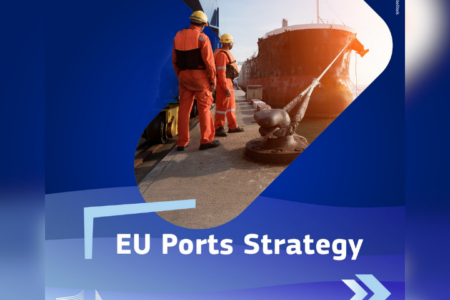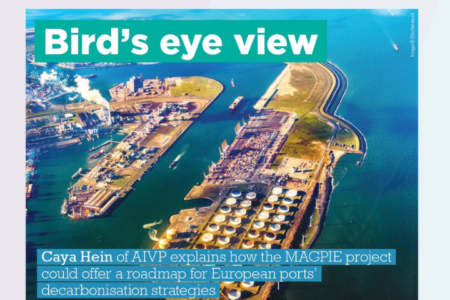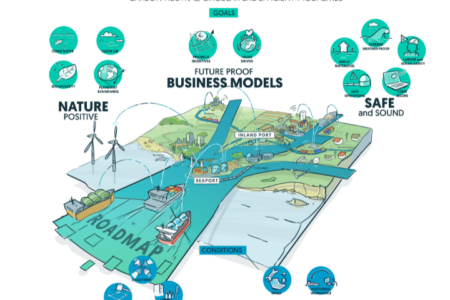April 10, 2025 APM Terminals MVII
Automated electric driving and automated charging technologies are making significant progress. Automation provides improved planning, reduced energy consumption, and increased productivity of the charge facilities. This is the key takeaway from the Automated & Electric Trucking demonstration event, held on April 10th at APM Terminals Maasvlakte II. The event was part of the MAGPIE project — an initiative co-funded by the European Horizon Europe program. The project is one of the ten innovative demonstration projects under the MAGPIE initiative, which is focused on the development of the smart green ports of the future. The event welcomed guests from companies in various international port areas, municipal and national governments, as well as partners from the European PIONEERS project.
Marieke Frensch, CTO of APM Terminals MVII, welcomed the audience. Reyer Will, project manager of the MAGPIE project, introduced the audience to the MAGPIE project objectives. He emphasized that both automated and electric road transport is a key piece in decarbonizing transport modalities in and around ports. Speakers at the event offered valuable insights into the future of sustainable and automated road transport in ports, discussing the implementation and upscaling. The relevance of the demonstrator for the Port of Rotterdam was highlighted by Berte Simons, COO of the Port of Rotterdam. She stated that the reduction of CO2-emissions by trucks is a step in the right direction for the port authority to reach its 2030 climate targets and is in line with the port’s energy transition strategy. How automated and electric trucking fits into the regulatory framework of the Netherlands was the subject of the keynote by Anouk van der Laan, Senior Policy Officer Smart Mobility, from the Ministry of Infrastructure & Water Management titled “Legislation, regulations, and ADS”. Jaco van Meijeren, Senior Lead Consultant Supply Chain Innovation at TNO, discussed the current developments in electric and automated trucking, the potential benefits and challenges, the activities within MAGPIE and the outlook towards implementation and scaling of electric and automated driving in logistic operations.
The latter half of the event was led by Guus Arts, Project Manager Advanced Technology at DAF Trucks, and Daan Nap, Head of Port Segment at Rocsys, who introduced the pilot project with an opportunity for the audience to provide feedback. After the presentations, the guests were invited to experience a live demonstration of an automated heavy-duty electric truck, seamlessly working together with the hands-free charging system.
The demonstration at Maasvlakte II represents a significant milestone in the automation of logistics operations on industrial sites, and is a prelude to new applications of automated trucks in industrial zones and on public roads in the distant future. The combination of electric driving and automated driving is an interesting combination as it helps avoid time consuming activities during charging, allows for improved data-driven planning, and addresses challenges in the logistical sector concerning sustainability, reliability, and productivity. It is also important to note that automated does not mean automatic; automated trucking is supposed to provide support to the truck drivers, not replace them.


